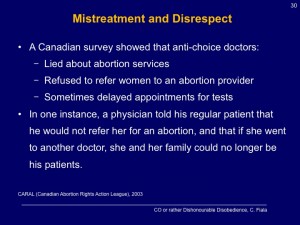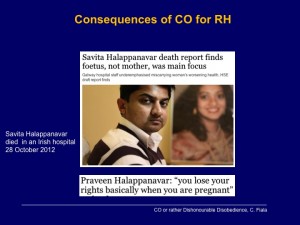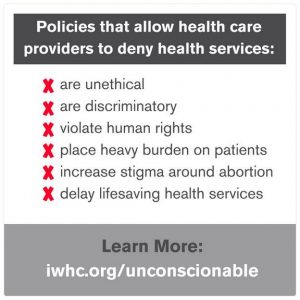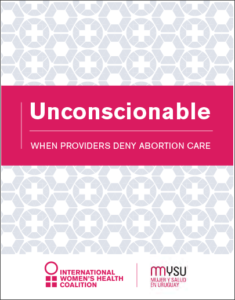Women’s health and lives are frequently put at risk in American Catholic hospitals, but only a few cases are publicized. We count 77 so far – 30 mostly anonymous cases are included here, and the rest described individually by name on the main “Victims of CO” page.
- Six individual cases are described in this Columbia Law School Report (Dec 2021): The Southern Hospitals Report: Faith, Culture, and Abortion Bans in the U.S. South. However, the report makes reference to the routine refusal of termination care in the southern U.S. affecting hundreds of women – in many cases risking their lives and health or causing grave suffering and injustice.
- One case (besides Alison’s and Meghan’s) is described in this Rewire article (Sep 2019): A Miscarrying Woman Nearly Died After a Catholic Hospital Sent Her Home Three Times.
- Three cases (besides Chelsea’s) are described in this Rewire article (Mar 2019): ‘Not Dead Enough’: Public Hospitals Deny Life-Saving Abortion Care to People in Need
- Four cases (besides Tamesha’s) are described in the The Guardian article (2016): Abortion ban linked to dangerous miscarriages at Catholic hospital.
- Six cases are described in the American Civil Liberties Association report (2016): Health Care Denied: Patients and Physicians Speak Out About Catholic Hospitals and the Threat to Women’s Health and Lives.
- One case is described in the American Civil Liberties Association report (2013, page 14): Miscarriage of Medicine: The Growth of Catholic Hospitals and the Threat to Reproductive Health Care.
- One case is described in AJOB Primary Research (2013): Conflicts in Care for Obstetric Complications in Catholic Hospitals.
- Three cases are described by the National Health Law Program (2010): Health Care Refusals: Undermining Quality Care for Women.
- Four cases are described in the American Journal of Public Health (2008): When There’s a Heartbeat: Miscarriage Management in Catholic-Owned Hospitals.
- One case is described in JAMA (2007): A Question of Faith.
Excerpts are below (names and dates are mostly unknown).
Dec 2021 Southern Hospitals Report excerpts:
1) Page 9: Dr. Jamila Perritt, president and CEO of Physicians for Reproductive Health, said:
I have colleagues that have expressed concerns their patients were not getting appropriate care because they were in religiously affiliated institutions… One particular patient stands out whose water broke at 20 weeks. Typically in this case, we review options for care as well as the
risks and benefits of each with the patient so that they can make the most informed decision. In this case these risks include an increased risk for infection, hemorrhage, and other outcomes that could put the pregnant person’s life at risk. But, this isn’t what happened for this patient. The providers only discussed one option – remaining pregnant. This person, my colleague, called me on my personal cell phone because we had been in training together and we’ve known each other for years and she said, ‘This is bad, this is malpractice. No one at all will even discuss an abortion with her and I’m afraid if I bring it up I’ll be penalized for even talking about it given the environment I’m practicing in’.
2) Page 10: One doctor working in a publicly affiliated facility in the Midwest said a a patient had been denied both an abortion and, she suspected, the best possible treatment for her cancer because of the hospital’s restrictive policies. The patient had acute leukemia and wanted to end her pregnancy, but her treating oncologists wrote in her medical chart that her pregnancy would not have any impact on her cancer care:
Because that was in her medical chart—that treatment was not going to change—it meant that from the hospital’s perspective she didn’t have a medical indication for termination of pregnancy. And we do not do elective terminations at our hospital.
We tried almost everything to get her the care she needed. She was deemed too sick to transfer to another hospital that would do that procedure and she essentially remained in the hospital for weeks being pregnant. She ultimately got a spinal abscess that caused quadriplegia, and she was still not allowed to have a termination…
She eventually miscarried at 17 weeks, which was about eight to nine weeks from her initial admission to the hospital. A miscarriage at 17 weeks is more difficult on the human body than an abortion at eight weeks. So that was unfortunate and difficult and frustrating…
Talking to some of the consultants on the side, some of them did feel like her [leukemia] care would change [if she weren’t pregnant]. They could try different treatments, they could do the same treatments but do it more aggressively and they wouldn’t have to worry about fetal effects or anything like that… [but] our hospital has to report…how many abortions are done at that hospital and they try their hardest to make that number zero.
3) Page 24: A medical resident working at a public hospital in Texas where abortions are severely restricted explained that doctors in her facility treat “a lot of women” experiencing symptoms of an early miscarriage where the “fetus does still have a heartbeat.” In these cases, providers do not even counsel patients about the possibility of ending their pregnancy. “We just sort of tell them…‘we’re going to watch and wait’. I’ve talked to some of my co-residents who’ve trained at other medical schools and…oftentimes they’re shocked by how we do miscarriage management.”
One doctor said of her publicly affiliated hospital in the Midwest: “You have to actually be dying, like, the day you get your abortion. You can’t be, like, dying tomorrow.” For example, this doctor recounted a patient who had:
“a huge mass on her cervix and she had invasive cervical cancer. And the treatment for that is… termination, and then chemotherapy and radiation. And [the person I called for ethics approval] essentially said because she wasn’t dying that day, they couldn’t do her abortion. But it’s not something that like Planned Parenthood can do vaginally. This was like a hysterectomy—major procedure—because if you try to do it vaginally, she would bleed to death.”
In this case, the provider team was forced to research whether another hospital could perform the patient’s procedure or administer a potassium chloride injection to end her pregnancy (“so we wouldn’t technically be doing an abortion”). Eventually, the doctors were able to treat the patient, “[b]ut it just took like a ton of energy from her oncologist, her OB-GYN, ethics, our risk assessment people. Just an unnecessary stall in her care.”
4) Page 25: Abortion restrictions could also result in traumatic experiences for patients facing fetal anomalies. Speaking of her residency in a public institution in the South, an OB-GYN said, “abortion was never talked about, it was never offered.” She recalled how patients with “horrific anomalies” would carry pregnancies to term rather than being offered the option of abortion care. One patient in particular had a fetus diagnosed with acrania, meaning it had no skull and would be unlikely to survive more than a couple days outside the womb. The doctor explained:
The way a fetus comes out of the birth canal requires a lot of head movement from the fetus… and so the one patient I had, the [fetus’s] head got stuck because it doesn’t know how to navigate the birth canal without an actual skull. And it was this horrifically long…prolonged labor, it ends up being horrific and taking forever…I would have felt way different had I known that she was given a choice and that this was important to her to deliver this baby and carry this baby… as opposed to traumatizing really everyone involved. I felt particularly traumatized knowing that there was a different option that I didn’t think she had been given.
While this incident stood out in the doctor’s memory because she was in charge of the patient’s delivery, she said it was “pretty common” for patients in her facility to carry to term and go through labor without having been offered, or counseled about, abortion as an option in the case of severe fetal anomaly.
5) Page 30: A medical resident at a public hospital in Texas had a patient with kidney disease who was close to the legal gestational age limit for abortion in Texas at the time. A clinic had sent her to seek care at a hospital because they “felt uncomfortable doing [an abortion] outpatient because of her severe medical comorbidities.” The doctor said that if this patient had continued her pregnancy, it could have “shorten[ed] her life significantly.” Nevertheless, the hospital’s burdensome approval process made it impossible for her to receive abortion care in time at the facility. The doctor explained that performing the patient’s abortion:
“would have to go through a large review process, where our maternal fetal medicine doctors would have to go before a committee in the hospital that consists of people in the hospital that are administrators, high-level—and not even OB-GYN physicians—and they would make a final decision of whether or not this termination would be approved. And that whole process takes several weeks, to get everything together and have all these meetings… What we ended up saying to [the patient] was, ‘we can’t get you this in time, so either you can establish care here and we will take care of you during your pregnancy as you continue it, or you need to go elsewhere.’… It was very frustrating that this woman was very sick and very much in need of this procedure—like one of the most medically necessary things you can make up in your mind—and it was not something we could offer her.”
6) Page 32: One doctor shared a particularly disturbing story about how an
anti-abortion psychiatrist in her facility—who would never be required to perform an abortion—still managed to impact patient care during the doctor’s residency in Ohio. When a patient transported from jail came to the hospital, she was pregnant and having suicidal thoughts.
The psychiatrist interviewed her and came out to discuss the case with the OB team. She told us the patient wasn’t suicidal, but rather, ‘feticidal,’ and should be discharged to jail. When we argued with her, she added that the patient had ‘a history of feticidal ideation’ because she’d had appointments for an abortion earlier in the pregnancy, but never went. The hospital ethicist and legal department refused to intervene. We couldn’t even transfer her to the university hospital because we couldn’t give her the diagnosis of ‘suicidal ideation.’
They wouldn’t let us keep her in the hospital. We discharged her from the hospital with no help, no support, and told her to follow up with outpatient resources. She was never seen again. The medical records in the city’s hospitals were mostly linked, so I could see that she never presented for care after that. I read obituaries for a long time looking for her name, scanned local news for updates, and nothing ever came up. The case haunts me to this day.
Sep 2019 Rewire excerpts:
A few years ago, Dr. Brigit Brock, a maternal fetal medicine specialist, was working at her outpatient consultation clinic in Everett, about 30 miles north of Seattle, when a patient arrived in preterm labor. At 20 or 21 weeks pregnant, before the fetus is viable, the patient’s cervix was open; her amniotic sac and parts of the umbilical cord were in the vagina. The patient needed to be hospitalized immediately, so she and her colleagues sent her to Providence Regional Medical Center Everett, a Catholic hospital attached to Brock’s outpatient clinic.
But the labor and delivery nurse told the patient and her husband that the Catholic hospital didn’t participate in abortions. Dr. Brock said: “She’s in pain and this is a devastating thing for them to go through, and they were not allowed even to step onto the labor and delivery floor.” When the patient returned to the outpatient clinic, Brock knew that if she called an ambulance, it might take some time to arrive and would likely take the woman back to Providence. So she told the patient’s husband to drive her to Swedish Medical Center in Seattle, which would take up to an hour in traffic.
Dr. Brock said it’s not the only time she’s seen this kind of case. “People think this is a rare event. This is not a rare event. This happens frequently.” Brock often works at Swedish Medical Center in Seattle, where she sometimes “rescues” patients from Catholic hospitals in surrounding communities by pulling them into the Swedish system.
Mar 2019 Rewire excerpts:
1) When she arrived at the public hospital in Texas, the woman was so sick she couldn’t walk. About four months pregnant, she needed an abortion to save her life. A previous pregnancy had led to heart failure. This time she faced a higher risk of death from cardiac arrest that increased as the pregnancy advanced.
But the hospital’s leadership denied her the abortion she needed. “It was decided that she was not going to be dying at that moment,” said Dr. Ghazaleh Moayedi, who cared for the patient. “It really was almost a cruel joke: that she wasn’t really dead enough to warrant intervention.”
When Moayedi broke the news, the patient was devastated. She was too ill to be seen in an outpatient clinic that lacked advanced resuscitation and heart monitoring equipment. Her options were to travel to New Mexico and pay thousands of dollars for a hospital abortion there—which she couldn’t afford—or continue a pregnancy that might kill her. Like millions of people in Texas, she lacked health insurance. Moayedi doesn’t know what happened to the patient. She never saw her again.
2) After she moved to another part of Texas, Moayedi appealed to a different public hospital for a patient with a pregnancy condition that put her at risk for complications including hysterectomy and hemorrhaging. The case seemed urgent to Moayedi, who had already watched one patient who carried a pregnancy to term with this condition require a 13-unit blood transfusion—more blood than a human body typically contains.
Again, hospital leadership said no to the abortion. “The response was that it was not actually imminently life-threatening, that sometimes people lived from the condition and so they would not intervene,” Moayedi said. This time, Moayedi was able to refer the woman to a private hospital.
3) Dr. Bhavik Kumar, an abortion provider at a stand-alone facility in Texas, said he recently safely performed an abortion for a patient whose placenta was in danger of growing into her caesarean-section scar. Another doctor had recommended the woman have her abortion in a hospital, but she said two hospitals—one that was part of a public hospital district, the other a faith-based nonprofit—refused to do the procedure. In New York, where he trained, Kumar said he “absolutely” would have referred this patient to a hospital. In Texas, he had no other option. “For this patient, the safest thing is for her to be not pregnant as soon as possible,” Kumar said.
2016 Guardian excerpts:
The woman inside the ambulance was miscarrying. That was clear from the foul-smelling fluid leaving her body. As the vehicle wailed toward the hospital, a doctor waiting for her arrival phoned a specialist, who was unequivocal: the baby would die. The woman might follow. Induce labor immediately.
But staff at the Mercy Health Partners hospital in Muskegon, Michigan would not induce labor for another 10 hours. Instead, they followed a set of directives written by the United States Conference of Catholic Bishops that forbid terminating a pregnancy unless the mother is in grave condition. Doctors decided they would delay until the woman showed signs of sepsis – a life-threatening response to an advanced infection – or the fetal heart stopped on its own.
In the end, it was sepsis. When the woman delivered, at 1.41am, doctors had been watching her temperature climb for more than eight hours. Her infant lived for 65 minutes.
This story is just one example of how a single Catholic hospital risked the health of five different women [including Tamesha] in a span of 17 months, according to a new report leaked to the Guardian.
The women were all experiencing a rare pregnancy complication in which the membranes surrounding the fetus rupture too early. When that happens before the fetus is viable, the rupture leads to a miscarriage.
All five women, the report says, had symptoms indicating that it would be safest for them to deliver immediately. But instead of informing the women of their options, the report says, or offering to transfer them to a different hospital, doctors – apparently out of deference to the Mercy Health Partners’ strict ban on abortion – unilaterally decided to subject the women to prolonged miscarriages.
As a result, the report claims, several of the women suffered infection or emotional trauma, or had to undergo unnecessary surgery.
None of the women in the report were more than 20 weeks pregnant – which is several weeks before the fetus can survive outside the womb. And all five women showed signs of infection, the report says, such as an elevated temperature or heart rate.
One of the women described in the complaint was given Tylenol for a potentially deadly infection and sent home – twice – where she miscarried by herself on the toilet. Another woman, the report says, spent three days in the hospital and eventually required additional surgery.
Yet staff never informed any of the women that there was an alternative to natural miscarriage – immediate delivery – or that immediate delivery is a safer option for women showing signs of infection, the report says. One woman told Groesbeck that even when she asked medical staff to deliver her infant, they refused.
One woman arrived at the hospital after seeing a fetal limb in her toilet. Staff dilated her, causing “a bulging bag of waters”, but refused her request to break her water and begin delivery, the report says.
“The patient was forced to wait over eighteen hours, while dilated, to complete the miscarriage naturally, resulting in retention of the placenta (a leading cause of maternal hemorrhaging and death) and additional, and potentially unnecessary, surgical intervention to remove it,” the report says. Later, a test of the placenta was positive for infection.
Another woman arrived in the early stages of miscarriage with an elevated temperature and heart rate, the report says. After a natural miscarriage, that woman also required surgery to remove the placenta – which also tested positive for acute infection.
2016 ACLU excerpts:
1. Maria (a pseudonym), a health care professional and mother of two in Washington State, was six to seven weeks along in her second pregnancy when she began experiencing heavy vaginal bleeding. She knew she was miscarrying and sought emergency care at the Catholic hospital where she was then working. Although she was aware of the hospital’s religious affiliation, her insurance coverage extended only to that hospital, and she could not afford thousands of dollars in costs to go elsewhere. Maria’s physician explained that the pregnancy was no longer viable and that her uterus needed to be evacuated in order to stop the bleeding. But, because the Directives prohibit an abortion if the fetus still has cardiac activity, her physician advised “expectant management,” i.e., waiting to see if Maria’s body would complete the miscarriage on its own.
The hospital staff delayed performing an abortion for hours while they attempted to verify through ultrasound that the fetus did not have a heartbeat, as required by the Directives. Finally, after seven hours, the hospital completed the miscarriage. By then, Maria’s iron levels were so low that she needed a blood transfusion. It was not without consequence. All blood transfusions carry risks, such as blood-borne infections and allergic reactions. But what happened to Maria was particularly dangerous. She was transfused with blood carrying Kell antigens and developed anti-Kell antibodies. Because her husband was Kell positive, this meant that their next pregnancy would be at risk for sudden fetal demise. When Maria became pregnant again several years later, she and her husband were terrified throughout that she would suddenly lose the pregnancy. Thankfully, their baby survived. But Maria and her family could have avoided significant emotional trauma if the Catholic hospital had provided her with the care she needed without hours of needless delay.
2. Dr. Rupa Natarajan was working in a Catholic hospital in New England when she encountered a 19-year-old pregnant woman experiencing preterm premature rupture of membranes at 17 weeks. The pregnancy was doomed, and the patient was getting very sick, so Dr. Natarajan determined that the best course would be to perform an abortion. But the hospital prohibited her from doing so. The patient was admitted but not treated, and over the next day, her temperature and heart rate climbed. By the time Dr. Natarajan could arrange to have her transferred to another hospital to save her life, the patient’s fever had reached 104 degrees. (5-minute video of Dr. Natarajan discussing the case)
3. Another OB-GYN on the East Coast recalled, “We had a woman experiencing preterm premature rupture of membranes at 16 weeks, but there was still a fetal heartbeat. The patient had to look into going elsewhere to get care because we weren’t permitted to deliver her. This puts a burden on the patient to go to a new doctor and have to relive everything [all] over again. Because of the delay in getting to another provider, the patient ended up delivering the [umbilical] cord at home—when the membranes rupture so early in pregnancy, sometimes the cord can be delivered first.
4. Dr. David Eisenberg recalled that “the sickest patient I ever cared for during my residency” was a young woman denied care at a Catholic hospital outside of Chicago, Illinois. Her water had broken well before the fetus was viable, but the hospital refused to take steps to hasten delivery even though everyone knew the fetus could never survive. By the time she was transferred to Dr. Eisenberg’s hospital 10 days later, she had a fever of 106 degrees and was dying of sepsis. She survived, but she suffered an acute kidney injury requiring dialysis and a cognitive injury due to the severity of her sepsis. She spent nearly two weeks in the hospital before being transferred to a long-term care facility. “I clearly remember sitting in her ICU room after her [uterine] evacuation, wondering if she would make it through the night,” Dr. Eisenberg recalled. “To this day, I have never seen someone so sick—because we would never wait that long before evacuating the uterus. Expediting the delivery is the right thing to do in such situations, always regardless of the religious affiliation of the hospital.”
5. Another OB-GYN told the ACLU about a patient she treated at a secular hospital in New England. The patient had previously been evaluated at a local Catholic hospital after she started bleeding around 12 weeks into her pregnancy. The Catholic hospital performed an ultrasound and found that the patient had an abnormal pregnancy “with placenta coming out of her cervix,” but because there was a fetal heartbeat, they told her she would have to wait. When the patient presented at this doctor’s hospital a week later, she was hemorrhaging and severely anemic from her blood loss over the past week. The medical team at the secular hospital performed emergency surgery and was just barely able to avoid the need for a hysterectomy—but the patient had to stay in the intensive care unit and needed transfusion of seven units of blood during her hospital stay. None of this would have been necessary had the Catholic hospital provided appropriate care when the patient first presented.
6. Dr. Colleen Krajewski, an OB-GYN in Pennsylvania, recalled a patient whose water had broken at the very beginning of her second trimester. She went to the hospital closest to her, which happened to be Catholic. Although it was apparent to all that the (much desired) pregnancy had no chance of survival, the patient was left in a hospital bed for two days to passively wait for a spontaneous miscarriage. The patient was devastated that she was losing the pregnancy, and her trauma was compounded each time the hospital staff came to check if there was still a fetal heartbeat. The treating physicians petitioned the hospital’s ethics committee to intervene, but the request was denied. The patient was eventually transferred to Dr. Krajewski’s hospital, which provided the appropriate care. Dr. Krajewski observed, “the hours-long, middle-of-the-night transfer added to the patient’s experience of fear and abandonment.”
2013 ACLU excerpt:
In 2010, a woman who was 15-weeks pregnant with twins arrived at the Sierra Vista (Arizona) emergency department after miscarrying one of the twins at home. The remaining fetus had a heartbeat. The doctor who examined her recommended that the pregnancy be terminated, given the low chances of a successful pregnancy and the risks of attempting to continue the pregnancy, including severe hemorrhaging and infection. The physician recalled, “The patient and her husband were, of course, upset by the situation, but decided to proceed with the treatment.”
The physician and staff then began routine preparations to complete the miscarriage. But the hospital was subject to Catholic Directives. A hospital administrator intervened and ordered the physician to transfer the patient to avoid violating the Directive against abortion. The patient was sent by ambulance to another hospital 80 miles away where she received the care she needed.
“It was a very gut-wrenching thing to put the staff through [and to] put the patient through, obviously,” recalled the attending physician. Another obstetrician felt misled by the hospital administration. “We were told that we wouldn’t have a problem with dealing with miscarriages … and it turned out not to be true.”
2013 AJOB excerpt:
A patient presented to the emergency room at a Catholic hospital with a molar pregnancy, for which the standard care is evacuation of the uterus. It was a twin pregnancy, with one healthy-appearing baby and the other a typical mole. Dr. P told the patient what her risks were. “She didn’t want to carry the pregnancy further but by the time she reached that decision, she was about 16 weeks gestation. And she had vaginal bleeding so of course she now goes to the hospital … And then you can’t do anything while she’s there [in the Catholic hospital], you can’t help her end the pregnancy in a hospital setting that’s safer.”
The ethics committee refused permission to end the pregnancy. Another doctor, Dr. L., said: “The clergy who made the decision Googled molar pregnancy.” Based upon this search, ethics committee members ruled, “There’s a possibility that she could actually have a viable pregnancy [because] there have been cases where a child was born.” Thus, the ethics committee identified treatment of this molar pregnancy as equivalent to abortion. Dr. L. said: “They called it a termination, which is a bogus term because you’re not terminating anything but a horrible situation.”
The patient was transferred out for care, despite her bleeding, and despite the fact that terminating a bleeding molar pregnancy is safer in the hospital setting due to a high risk of hemorrhage.
2010 National Health Law Program excerpts:
1. Carla, who lives in eastern Oklahoma, thought she had the flu. Her family doctor referred her to an Obstetrician/Gynecologist (OB/GYN) who discovered she was pregnant and that she had a large mass growing on her uterus. Carla’s youngest child was already 16, and she decided to have an abortion, but when she went to the abortion clinic she was told that she needed to have the mass removed before she could have the abortion. Then her encounter with health care refusals began. The OB/GYN refused to remove the mass because it would endanger the pregnancy. The anesthesiologist in the practice group refused to give her any drugs that would harm the pregnancy. At this point the mass was shutting off her colon and bladder. Eventually Carla found a doctor an hour and a half away in another city, but due to the substantial delay, he had to remove her uterus, a procedure that would have been unnecessary if the abortion had been performed earlier in her pregnancy. Carla and her family were left with $40,000 in medical bills.
(NHLP reference: Story collected as part of the Heartland Abortion Regulation Project; PI Weitz, approved by the Institutional Review Board of the University of California, San Francisco, #H11760-29203, data on file)
2. Dr. Smits was a physician at St. Mary’s hospital in a large Eastern city. The patient was 19 weeks pregnant and her membranes had ruptured. The fetus was not yet viable and the patient was septic as a result of PROM. Dr. Smits and the patient wanted to end the pregnancy to save the woman’s health, but the hospital ethics committee refused to approve the termination because the fetus still had a heartbeat. Dr. Smits was giving the woman medications to keep her blood pressure up and using a cooling blanket to keep her temperature down. As Dr. Smits said, “this woman was dying before our eyes.” And still the ethics committee refused to approve the termination. The patient was in ICU for ten days, and nearly died. The fetus died in utero. The woman had substantial internal bleeding, and developed pulmonary disease, resulting in lifetime oxygen dependency.
(NHLP reference: Freedman L. Willing and unable: doctors’ constraints in abortion care: University of California, Davis, Retrieved October 12, 2009 from Dissertations & Theses @ University of California. Publication No. AAT 3329612; 2009)
3. Dr. Brill described another doctor at the hospital at which he worked. The patient had placental abruption, where the placenta separates from the uterus and puts the patient at extreme risk for internal bleeding. If left untreated, the patient may need transfusions or even bleed to death. The treating physician was a “fundamental Christian.” The patient was 20 weeks pregnant. The physician refused to terminate the pregnancy. Instead he tried to stop the bleeding and to stop the labor. She continued to bleed. A week or two later, she spontaneously aborted, but not until she required several blood transfusions.
(NHLP reference: Freedman L. Willing and unable: doctors’ constraints in abortion care: University of California, Davis, Retrieved
October 12, 2009 from Dissertations & Theses @ University of California. Publication No. AAT 3329612; 2009.)
2008 American Journal of Public Health excerpts:
Intro: Obstetrician–gynecologists working in Catholic-owned hospitals described cases in which abortion was medically indicated according to their medical judgment but, because of the ethics committee’s ruling, it was delayed until either fetal heartbeats ceased or the patient could be transported to another facility. Dr P, from a midwestern, mid-sized city, said that at her Catholic-owned hospital, approval for termination of pregnancy was rare if a fetal heartbeat was present (even in “people who are bleeding, they’re all the way dilated, and they’re only 17 weeks”) unless “it looks like she’s going to die if we don’t do it.”
1. In another case, Dr H, from the same Catholic-owned hospital in the Midwest, sent her patient by ambulance 90 miles to the nearest institution where the patient could have an abortion because the ethics committee refused to approve her case.
“She was very early, 14 weeks. She came in … and there was a hand sticking out of the cervix. Clearly the membranes had ruptured and she was trying to deliver… . There was a heart rate, and [we called] the ethics committee, and they [said], “Nope, can’t do anything.” So we had to send her to [the university hospital]… . You know, these things don’t happen that often, but from what I understand it, it’s pretty clear. Even if mom is very sick, you know, potentially life threatening, can’t do anything.”
2. Dr B, an obstetrician–gynecologist working in an academic medical center, described how a Catholic-owned hospital in her western urban area asked her to accept a patient who was already septic. When she received the request, she recommended that the physician from the Catholic-owned hospital perform a uterine aspiration there and not further risk the health of the woman by delaying her care with the transport.
Because the fetus was still alive, they wouldn’t intervene. And she was hemorrhaging, and they called me and wanted to transport her, and I said, “It sounds like she’s unstable, and it sounds like you need to take care of her there.” And I was on a recorded line, I reported them as an EMTALA [Emergency Medical Treatment and Active Labor Act] violation. And the physician [said], “This isn’t something that we can take care of.” And I [said], “Well, if I don’t accept her, what are you going to do with her?” [He answered], “We’ll put her on a floor [i.e., admit her to a bed in the hospital instead of keeping her in the emergency room]; we’ll transfuse her as much as we can, and we’ll just wait till the fetus dies.”
Ultimately, Dr B chose to accept the patient to spare her unnecessary suffering and harm, but she saw this case as a form of “patient dumping,” because the patient was denied treatment and transported while unstable.
3. Some doctors have decided to take matters into their own hands. In the following case, the refusal of the hospital ethics committee to approve uterine evacuation not only caused significant harm to the patient but compelled a perinatologist, Dr S, now practicing in a nonsectarian academic medical center, to violate protocol and resign from his position in an urban northeastern Catholic-owned hospital.
“I’ll never forget this; it was awful—I had one of my partners accept this patient at 19 weeks. The pregnancy was in the vagina. It was over… . And so he takes this patient and transferred her to [our] tertiary medical center, which I was just livid about, and, you know, “we’re going to save the pregnancy.” So of course, I’m on call when she gets septic, and she’s septic to the point that I’m pushing pressors on labor and delivery trying to keep her blood pressure up, and I have her on a cooling blanket because she’s 106 degrees. And I needed to get everything out. And so I put the ultrasound machine on and there was still a heartbeat, and [the ethics committee] wouldn’t let me because there was still a heartbeat. This woman is dying before our eyes. I went in to examine her, and I was able to find the umbilical cord through the membranes and just snapped the umbilical cord and so that I could put the ultrasound—“Oh look. No heartbeat. Let’s go.” She was so sick she was in the [intensive care unit] for about 10 days and very nearly died… . She was in DIC [disseminated intravascular coagulopathy]… . Her bleeding was so bad that the sclera, the white of her eyes, were red, filled with blood… . And I said, “I just can’t do this. I can’t put myself behind this. This is not worth it to me.” That’s why I left.”
From Dr S’s perspective, the chances for fetal life were nonexistent given the septic maternal environment. For the ethics committee, however, the present yet waning fetal heart tones were evidence of fetal life that precluded intervention. Rather than struggle longer to convince his committee to make an exception and grant approval for termination of pregnancy, Dr S chose to covertly sever the patient’s umbilical cord so that the fetal heartbeat would cease and evacuation of the uterus could “legitimately” proceed.
4. Dr. G also circumvented the ethics committee in her southern Catholic-owned hospital. She opted not to check fetal heart tones or seek ethics committee approval when caring for a miscarrying woman for fear that documentation of fetal heart tones would have caused unnecessary delays. This led to conflict with the nurse assisting her.
“She was 14 weeks and the membranes were literally out of the cervix and hanging in the vagina. And so with her I could just take care of it in the [emergency room] but her cervix wasn’t open enough … so we went to the operating room and the nurse kept asking me, “Was there heart tones, was there heart tones?” I said “I don’t know. I don’t know.” Which I kind of knew there would be. But she said, “Well, did you check?” … I said, “I don’t need an ultrasound to tell me that it’s inevitable … you can just put, ‘The heart tones weren’t documented,’ and then they can interpret that however they want to interpret that.” … I said, “Throw it back at me … I’m not going to order an ultrasound. It’s silly.” Because then that’s the thing; it would have muddied the water in this case.”
Dr G’s main concern was sparing the patient extended suffering during loss of pregnancy. She disregarded the authority and protocol of the hospital ethics committee by not checking for fetal heart tones, which, she believed, would have led to significant delay in the inevitable treatment.
2007 report from JAMA:
A 35-year old woman in her 21st week of pregnancy presented to an emergency department in a hospital (possibly in Missouri) because she was miscarrying twins. Alhtough it was a much-wanted pregnancy and the staff spent two days trying to save the pregnancy, the fetal membranes continued to prolapse.
The woman and her husband (Dr. Ramesh Raghavan, the author of this JAMA article) decided to terminate after being informed of the major risk of infection, but were shocked when the hospital refused due to their strict policy against “elective” abortions. The woman had to be transported to a nearby university teaching hospital for life-saving treatment. Dr. Raghavan said: “This is why hospital policies that originate in religion rather than in science can be unhealthy and unsafe.”














